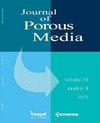Investigating Heat Transfer Enhancement Using Metal Foam in Double Tube Heat Exchangers-Experimental Approach
IF 2.3
4区 工程技术
Q2 ENGINEERING, MECHANICAL
引用次数: 0
Abstract
This study addresses the imperative requirement for efficient utilization of solar energy by examining the incorporation of metal foam heat exchangers into solar flat plate collectors, with a focus on enhancing their thermal performance. The primary objective of this study is to experimentally evaluate single-phase double-tube heat exchangers with and without the incorporation of metal foam in the annular space. By conducting experiments with hot and cold water at various flow rates, the research aims to assess the impact of metal foam on key parameters such as heat transfer coefficient, Nusselt number, Reynolds number, effectiveness, and pressure drop. Furthermore, the study compares the experimental results with established correlations from existing literature. The experiments are performed with hot and cold water at different flow rates of 25 liters per hour and (25-50) liters per hour at 650C and room temperature, respectively. Nickel metal foam with 10 Pores Per Inch and 0.9 porosity is fitted in the annular space. The results of the study indicate that the incorporation of metal foam leads to a significant improvement in heat transfer performance, up to 2.2 times compared to a traditional heat exchanger. However, this enhancement in heat transfer comes at the cost of increased pressure drop across the metal foam heat exchanger. The investigation is significant as it offers insights into the potential of metal foam to improve heat exchanger performance. Therefore, the research highlights the existence of a trade-off between heat transfer efficiency and pressure drop when designing double-tube heat exchangers with metal foam. This work provides valuable insights into研究在双管热交换器中使用金属泡沫增强传热--实验法
本研究通过研究在太阳能平板集热器中加入金属泡沫热交换器,重点提高其热能性能,从而满足高效利用太阳能的迫切要求。本研究的主要目的是对环形空间中加入和未加入金属泡沫的单相双管热交换器进行实验评估。通过对不同流速的热水和冷水进行实验,研究旨在评估金属泡沫对传热系数、努塞尔特数、雷诺数、效率和压降等关键参数的影响。此外,研究还将实验结果与现有文献中的既定相关性进行了比较。实验分别在 650 摄氏度和室温下以 25 升/小时和(25-50)升/小时的不同流速对热水和冷水进行。在环形空间中安装了每英寸 10 个孔且孔隙率为 0.9 的镍金属泡沫。研究结果表明,与传统的热交换器相比,加入金属泡沫可显著提高传热性能,最高可达 2.2 倍。然而,热传递性能的提高是以金属泡沫热交换器压降的增加为代价的。这项研究意义重大,因为它深入揭示了金属泡沫改善热交换器性能的潜力。因此,这项研究强调,在设计使用金属泡沫的双管热交换器时,需要在传热效率和压降之间进行权衡。这项工作为以下方面提供了宝贵的见解
本文章由计算机程序翻译,如有差异,请以英文原文为准。
求助全文
约1分钟内获得全文
求助全文
来源期刊

Journal of Porous Media
工程技术-工程:机械
CiteScore
3.50
自引率
8.70%
发文量
89
审稿时长
12.5 months
期刊介绍:
The Journal of Porous Media publishes original full-length research articles (and technical notes) in a wide variety of areas related to porous media studies, such as mathematical modeling, numerical and experimental techniques, industrial and environmental heat and mass transfer, conduction, convection, radiation, particle transport and capillary effects, reactive flows, deformable porous media, biomedical applications, and mechanics of the porous substrate. Emphasis will be given to manuscripts that present novel findings pertinent to these areas. The journal will also consider publication of state-of-the-art reviews. Manuscripts applying known methods to previously solved problems or providing results in the absence of scientific motivation or application will not be accepted. Submitted articles should contribute to the understanding of specific scientific problems or to solution techniques that are useful in applications. Papers that link theory with computational practice to provide insight into the processes are welcome.
 求助内容:
求助内容: 应助结果提醒方式:
应助结果提醒方式:


